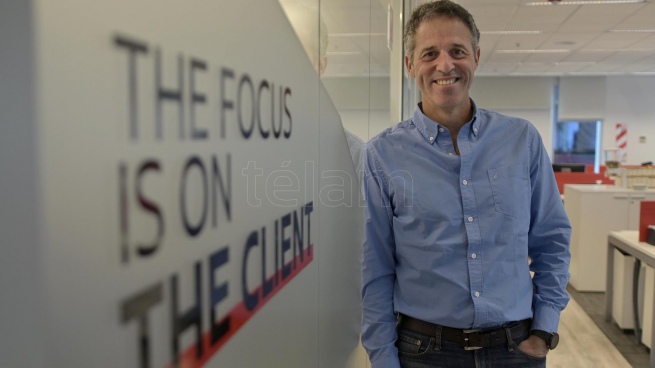The president of Nissan Argentina, Gonzalo Igarzábal, assured that the country “is a competitive market for the production and export” of automobiles, which will allow the brand to incorporate a second shift with 550 new workers at the beginning of the second half of the year and double the manufacture of Frontier pick ups from its plant in Córdoba.
In an interview with Télam, Igarzábal stated that the country “could sell many more units in the local market, but like the rest of the world, it is experiencing an unsatisfied global demand.”
Télam:- Nissan is the youngest terminal in the country as it began production in 2018. How was this development until announcing a second production shift?
Gonzalo Igarzábal:- Since we started producing the first Frontiers in Córdoba, we have always aimed with the clear idea of exporting strongly to Brazil, our most important trading partner by far with a market of 2.5 million cars. But also a very important leg for us is local content. That is where today we are over 35% localized with a focus on continuing to grow. And in the long-term view, these are key axes in which one has to be anchored, and the growth numbers that the brand has had is largely thanks to these pillars. The investments are showing their results, which is why we are starting to export Euro 6 to Brazil and we are presenting the new Frontier, which also allows us to open new markets and attend to those that move towards this technology, as we will do with Chile and Colombia for the purposes of this year.
T:- How is this progression of production and exports going to be?
GI:- Until today we have produced 50,000 pick ups and exported more than 32,000 units, so we have exported 65% of everything we have produced and the intention going forward with this second shift that we are going to be starting in the coming months is to go to 50,000 units per year and maintaining or increasing in some cases also the export levels that we are having today. The intention is to double the number of trucks produced in Córdoba.
T:- In a complex macroeconomic panorama, can local integration be increased, as the Government demands from the terminals?
GI:- We have been working on it since the genesis of the project because it seems to us the way to make a sustainable business. It generates a lot of advantages from exchange rate hedging to logistic proximity, and it is an advantage for the business hand in hand with suppliers, with their investments and with ours, but the medium-term intention is to go above 40% of local content. This takes time and work but results in a general growth of the brand and the product that has been working very well in Argentina and Brazil.
T:- What is the position of the brand in the market today?
GI:- In 2018 we started with about 2% to 3% participation, today we are above 10% with record months of 11.8% but the product goes for much more and we can do it with our dealers who are growing, generating employment and giving a greater coverage of the country. Last year we opened 14 dealerships, this year we will add another eight until we reach 60, and the idea is to reach 80 shortly.
T:- The conditions of competitiveness offered by Argentina are always debated in the industry. How does the brand go through this situation?
GI:- Today it seems to me that we are a competitive market for the manufacture of pick ups, and it seems to me that the different tools are worked on in detail in each company. We have to work on competitiveness in our products, in our suppliers, in our dealers, that is, it is throughout the chain, to go out and compete in Brazil, in Chile, in Colombia and win marks, but Argentina is on that path.
T:- The brands also suggest that more could be produced and sold, but that local conditions make it difficult. How do you see it from Nissan?
GI:- Today I would say that they are more global issues. It is a general issue, there is a lack of semiconductors that impacts all the terminals globally, and there are all the very tense supply chains today, and Argentina does not escape that situation. Here in Mexico, in the United States, we would like to have more cars in the United States.
So, there is a global unsatisfied demand, and in that sense we see today it is difficult to say how far our market could go.
T:- How is this announced process of imminent growth going to be?
GI:- We have been hiring 550 workers for a month to start the second shift in the next two months and obviously the focus is to go next year for these 50,000 units in 2023, which is the same amount of everything produced up to today in our first four years, and 65% export it or a little more. So, the muscle that we are going to begin to have and the strength that we are going to begin to have as a brand is clearly going to be different and we will begin to compete in a different way at the local and regional level.
T:- How do you see the electricity market in the country and the possibility of productive transformation in the same sense?
GI:- The cars are already there. We are bringing them and the intention is to continue growing and slowly the infrastructure is taking flight and already the radius in which one can drive with an electric car is expanding in the Capital and Greater Buenos Aires, but we are also in Rosario, in Córdoba and With that growth, push the rest of the country.
Going forward, first we have to generate that internal market and then as a country we have lithium present in the north, which is a competitive advantage to be able to think and develop a future that is still far away. Today where strong progress is being made is in the northern hemisphere. That is why we first have to focus on making our own industry grow, in making our own exports grow, and to the extent that we achieve this, electrification is going to happen naturally, because the world itself is going to push us to that side, always adding Brazil to everything we plan at the regional level will be key.










